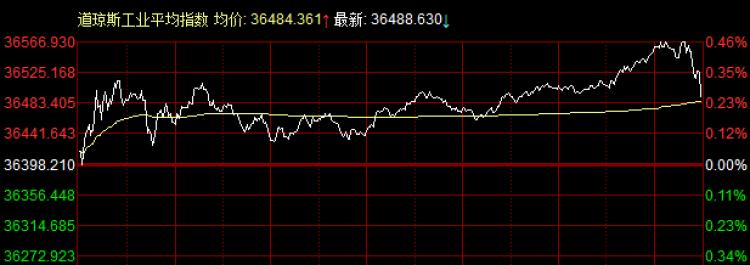The highlights of the foreign market: Overnight, the European and American stock markets as a whole continued to rise slightly, with the Dow and S&P hitting new closing highs, but the NASDAQ pulled back slightly. The S&P 500 broke the closing price record for the 70th time in the year; international crude oil futures were short-term strong, with U.S. oil and cloth oil both rising 3 consecutively, hitting a new 5-week high; the overnight dollar index weakened, the index broke 96, and the short-term moving average group was slightly dead.

Looking at the specific data of the US stock market overnight, by the close, the Dow Jones Industrial Average rose 90.42 points, or 0.25%, to close at 36489 points; the Nasdaq Composite Index fell 15.50 points, or 0.10%, to close at 15766 points; and the S&P 500 index rose 6.71 points, or 0.14%, to close at 4793 points.
In Terms of European stocks, by the close, the FTSE Europe Index rose 0.31%, the London Financial Times 100 Index rose 0.66%, the French CAC40 Index fell 0.27%, the German DAX30 Index fell 0.70%, the Italian MIB Index fell 0.37%, the Austrian ATX Index rose 0.26%, and the Spanish IBEX35 Index fell 0.17%.
At present, the overbought indicators of the US stock market are on the high side, and the three major indexes have risen by about 23% on average so far this year. Goldman Sachs pointed out that the era of brainless bullishness is over. Pasquarillo, global head of hedge fund business under Goldman Sachs, said in a recent weekly market/macro review that 2021 will be an extraordinary year, and certainly not for the United States: record mergers and acquisitions, record new stock and new debt issuance, record retail transactions... The stock market, the housing market and the digital sector all hit record highs. But for now, it's hard to see the tail of the upside clearly, and the era of "irresponsible bullishness" may be over.
Overnight market performance of the top 7 technology stocks in the United States: Meta fell 0.95%, Amazon fell 0.86%, Tesla fell 0.21%, Apple rose 0.05%, Netflix fell 0.03%, Google A fell 0.02%; Microsoft rose 0.21%. On the relevant news, Tesla CEO Musk said in an interview yesterday that its space exploration technology company SpaceX will send humans to Mars in about 5 to 10 years at the earliest. Meanwhile, Tesla's filing with the U.S. Securities and Exchange Commission on Tuesday showed that Musk again sold a large number of the company's shares on Tuesday, selling a total of 934,090 shares, cashing out $1.02 billion. Musk has sold about 15.8 million shares of Tesla stock since he consulted on Social Media on Nov. 7 on whether to sell 10 percent of the stock, but is still short of the 10 percent target. Based on the number of shares held before the consultation, Musk will have to sell about 17 million shares to reach the 10% target.
In terms of international crude oil, the main U.S. oil futures contract closed overnight at $76.60 per barrel, up 0.82%, and the main cloth oil contract closed at $79.20 per barrel, up 0.67%.
On December 29, WHO Director-General Tedros Adhanom Ghebreyesus said at a press conference that at present, the Delta and Omicron variants pose a "double threat", setting a record number of new crown pneumonia cases worldwide and once again leading to a surge in hospitalizations and deaths. Tedros said the Omiljung variant is more transmissible, and it spreads at the same time as the Delta variant, resulting in a "tsunami-like" confirmed case of COVID-19, which he is highly concerned about.
According to the CCTV news client, on the evening of December 27, local time, the US Centers for Disease Control and Prevention released a report saying that at least 75 cruise ships have outbreaks of the new crown epidemic, and the department is investigating, observing and monitoring them. The report shows that the CDC is currently investigating the spread of the epidemic on 36 vessels, and another 32 vessels have been completed and are under further observation. The report did not indicate the number of infections on each vessel and the timing of the outbreak.
The U.S. merchandise trade deficit hit a record high in November. Data released by the Commerce Department on Wednesday showed that the merchandise trade deficit rose to a record level of $97.8 billion in November. Imports rose 4.7 percent to $252.4 billion, with imports of industrial supplies increasing the most. Imports of consumer goods rose to a record $67 billion. Exports fell to $154.7 billion.
The EU is considering raising the debt ceiling for member states. It is reported that the EU is considering amending the Stability and Growth Pact, no longer setting a unified debt ceiling, allowing member states to set a reasonable scale of borrowing according to their own national conditions. Since March 2020, EU member states have unanimously decided to suspend the implementation of the EU Stability and Growth Pact until the end of 2022. Subsequently, EU countries issued various subsidies in large quantities in response to the epidemic and significantly increased public expenditures such as medical care, and the size of the debt of all countries exceeded the upper limit set by the convention of not more than 60% of GDP.
Brazil's unemployment rate fell slightly in the third quarter of this year. According to data released by the Institute of Geography and Statistics, which belongs to the Brazilian Ministry of Economy, on December 28, local time, the country's unemployment rate fell to 12.1% during the statistical cycle from August to October 2021. Compared with the unemployment rate of 13.7% in the previous statistical cycle and the unemployment rate of 14.6% in the same period of 2020, the employment situation has improved, but the number of unemployed is still as high as 12.9 million.